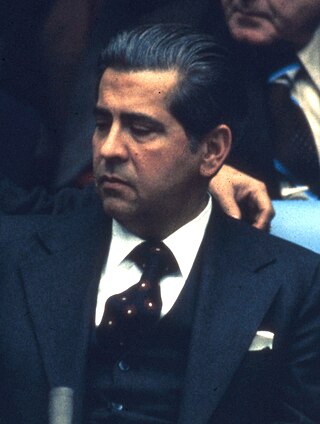Related Research Articles

The People's Party is a Panamanian Christian democratic political party. Beginning in 1956, as Social Democratic Action, it was made up of middle-class professionals, intellectuals and students, with support from trade unions, particularly the Federation of Christian Workers. It went on to become one of Latin America's most conservative and anti-communist Christian democratic parties. The ideological foundation of the party is based on the social doctrine of the Catholic Church. The PP is a full member of the Christian Democrat International and Christian Democratic Organization of America.

General elections were held in Panama on 7 May 1989, with the goal of electing both a new President of the Republic and a new Legislative Assembly. The two primary candidates in the presidential race were Guillermo Endara, who headed Democratic Alliance of Civic Opposition (ADOC), a coalition opposed to military ruler Manuel Noriega, and Carlos Duque, who headed the pro-Noriega Democratic Revolutionary Party (PRD).

General elections were held in Panama on 20 May 1960, electing both a new President of the Republic and a new National Assembly.

General elections were held in Panama on 13 May 1956, electing both a new President of the Republic and a new National Assembly.

General elections were held in Panama on 11 May 1940, electing both a new President of the Republic and a new National Assembly.
DIPAL Party, was a Panamanian political party.
The Democratic Action Party was a Panamanian conservative political party.
The Liberal Civil Resistance Party was a Panamanian centrist liberal political party.

Aquilino Edgardo Boyd de la Guardia was a Panamanian politician, diplomat and lawyer.
The Progressive National Party was a Panamanian conservative nationalist, personalistic political party.
The National Reformist Party was a Panamanian small center-left political party.
The Third Nationalist Party was a Panamanian conservative, radical nationalist political party.
The National Patriotic Coalition was a Panamanian conservative nationalist political party.
The National Liberation Movement was a Panamanian right-wing liberal political party.
The Revolutionary Isthmian Party was a Panamanian left-wing political party.
The National Civic Party was a Panamanian small liberal political party.
The Radical Action Party was a Panamanian small centre-right political party.
The Renewal Party was a Panamanian right liberal political party.
The Popular Union Party was a Panamanian centrist liberal political party.
Raúl Arango Navarro was a politician from Panama who was Vice President of Panama and chief commander of the fire department of Panama.
References
- ↑ Panama: election factbook, May 12, 1968. Washington: Institute for the Comparative Study of Political Systems. 1968. Pp. 21.
- ↑ Special warfare area handbook for Panama. Corporate Author : American Univ. Washington D.C. Report Date: 1962. Pp. 254.
- ↑ Panama: election factbook, May 12, 1968. Washington: Institute for the Comparative Study of Political Systems. 1968. Pp. 21.
- ↑ Who's Who in Latin America: government, politics, banking, and industry. Edited by Bettina Corke. New York: Norman Ross, 1993. Vol. 3. Pp. 270.
- ↑ Panama: election factbook, May 12, 1968. Washington: Institute for the Comparative Study of Political Systems. 1968. Pp. 21.
- ↑ Elections in the Americas : a data handbook / ed. by Dieter Nohlen, Vol. 1. [Oxford] [u.a.]: Oxford Univ. Press, 2005. Pp. 532.
- ↑ Panama: election factbook, May 12, 1968. Washington: Institute for the Comparative Study of Political Systems. 1968. Pp. 21.
- ↑ The Panama News. Vol. 10, No. 17, September 5–18, 2004.
- ↑ The International Who's Who 2004, by Europa Publications. Routledge, 2003. Pp. 209.
- ↑ The May 7, 1989 Panamanian Elections. International Delegation Report. 1989. Pp. 36. (http://www.cartercenter.org/documents/electionreports/democracy/FinalReportPanama1989.pdf)